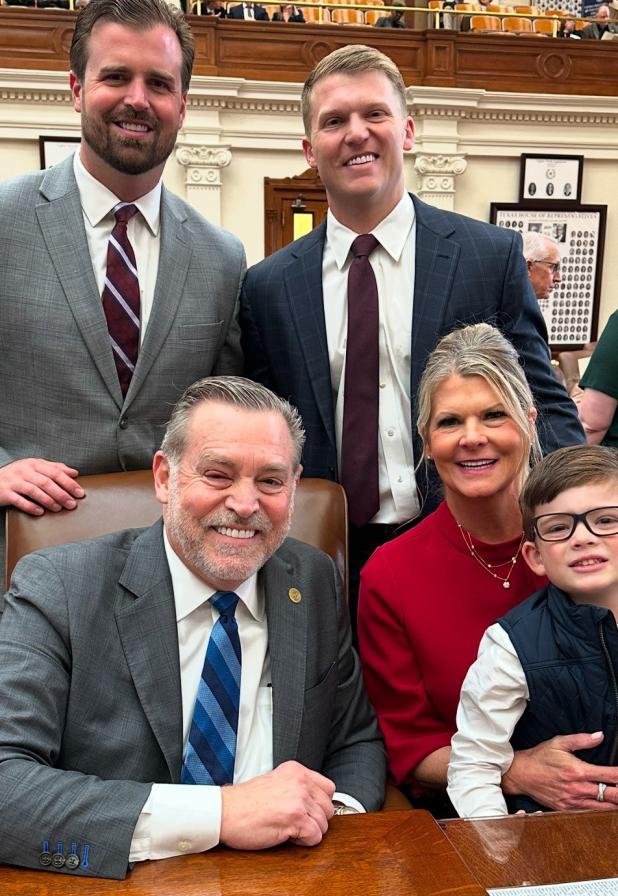
Spiller, Hagenbuch sworn in at 89th session
State Rep. David Spiller said he is confident that he can work with House Speaker Dustin Burrows despite voting for the opposing candidate – Rep. David Cook – who was favored by Gov. Greg Abbott and Lt. Gov. Dan Patrick.
The House vote for Lubbock Republican Burrows could return some consideration to rural districts in the ongoing battle over public school vouchers, also known as “Education Savings Accounts.”
Rep. Spiller, R-Jacksboro, and Sen. Brent Hagenbuch, R-Denton, took the oath of office in their respective legislative chambers last week for the start of the 89th Texas legislative session.
The Speaker’s election was one of the first orders of business since Gov. Abbott helped to unseat a number of rural Republicans who stalled his voucher plan in four special sessions in 2023. School vouchers are also a top item for Gov. Abbott and his legislative allies but the vote against Abbott’s choice for Speaker indicates that the governor may not have the sway he expected in the House.
The Governor has received millions of dollars in campaign contributions from wealthy donors who support vouchers including some who do not reside in Texas, campaign records show.
The voucher plan would allow parents to use taxpayer dollars that fund public schools to pay for private and religious schools.
Administrators and teachers at the Olney Independent School District voiced strong disapproval of the plan, saying it will strip already underfunded programs for the benefit of private schools, which would have no academic or financial accountability under the proposed ESA program.
Rep. Spiller said he was pleased with the selection of Mr. Burrows as House Speaker.
“Chairman Burrows is a great friend and I am confident he will lead the Texas House in a conservative and effective manner.”
Rep. Spiller, who initially opposed vouchers and then supported a voucher bill that he said would protect rural districts, said he was “eager to get to work for my constituents and the people of Texas.”
Rep. Spiller acknowledged that the opinions of his constituents is mixed and that “it is a difficult issue.”
“Admittedly, I have concerns about ESA’s as they have been presented, including the potential long-term costs to our state (including the possibility of future increased property taxes and sales taxes to pay for them), a lack of accountability, a lack of transparency, and the fact that private schools do not have the same enrollment, accessibility and other requirements placed on public schools,” he said in a statement. “My obligation on this issue is to continue to work as hard as I can on behalf of my district and in the best interest of the children of House District 68. I will continue to work with stakeholders to ensure that my school districts are not negatively affected by any potential school choice legislation.”
Sen. Hagenbuch, who was endorsed by Gov. Abbott and his Senate predecessor Drew Springer, could not be reached for comment. He said in an interview with the Enterprise in 2024 that while he thinks “highly” of Texas public schools, and believes teacher pay should not be linked to the passage of school vouchers, he supports “parental choice” and believes some “kids are being indoctrinated by a liberal ‘woke’ agenda.”
He also said he would consider supporting a carve-out that prevented rural school districts with smaller populations from participating in the voucher scheme.
In a statement issued shortly after Speaker Burrows’ victory, Lt. Gov. Patrick said he was “counting on Speaker Burrows and will work with him to deliver on his promise to pass important conservative legislation that previously failed to pass the House.”
Mr. Paxton also issued a statement saying that “it is now important that Speaker Burrows and his leadership team pass every conservative legislative priority in a timely manner to make our state more secure and prosperous.”
In 2023, Gov. Abbott declined to raise public school teachers’ salaries or school funding unless lawmakers agreed to pass a voucher plan. Olney’s school board dipped into the school’s reserves to give teachers raises to offset inflation and keep their staff roster filled.
Some rural Republicans who oppose vouchers pointed to the voucher program in Arizona, which passed in 2022 and quickly ballooned from an original official cost estimate of just under $65 million to roughly $332 million for just 60,000 children, according to an analysis by the Arizona nonpartisan think tank Grand Canyon Institute.
